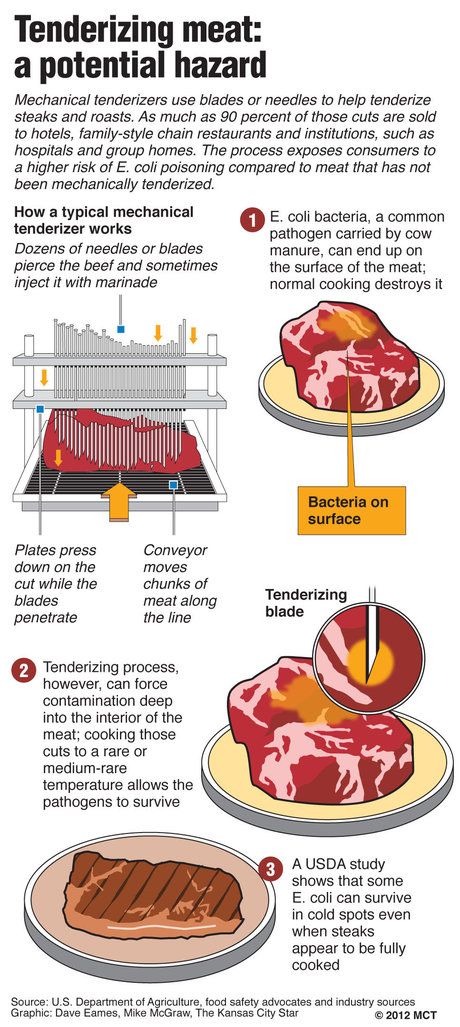Cross posted from The Stars Hollow Gazette
Costco is the largest membership warehouse club chain in the United States and, unlike Walmart, has managed to give its employees a fair living wage and benefits. One other thing they do, they have a level of food safety that exceeds government standards:
Costco’s 250,000-square-foot beef plant in California’s fertile San Joaquin Valley is not your typical meat plant.
It’s relatively new and spotless. There are high-tech, hand-wash sanitation stations scattered throughout the plant connected to counters that allow plant officials to make sure each employee uses them at least four times daily.
It’s relatively new and spotless. There are high-tech, hand-wash sanitation stations scattered throughout the plant connected to counters that allow plant officials to make sure each employee uses them at least four times daily.
The massive meatball cook room is built entirely of stainless steel. Even the loading docks, where trucks deliver raw beef, is sanitized regularly to prevent contamination. [..]
The plant has a decided advantage over Big Beef’s slaughter plants because they don’t kill cattle here, so there are no manure-covered hides or intestines to contaminate raw beef products.
But just the same, Costco’s approach is different.
All meat arriving at the Tracy plant comes with a certificate from the supplier pledging that pre-shipment tests showed no E. coli contamination, something other companies are also doing now. But Costco tests it anyway, and if it tests positive, it’s shipped back to the supplier. Less than one percent is shipped back.
Then the finished products – hot dogs, hamburger patties, ground beef, Polish sausages and meatballs – are tested again before they leave the plant.
In fact, Costco officials boast that, until recently, they did more E. coli testing in the company’s lab than the USDA does nationwide at all other beef plants combined.
Despite all precautions, Costco did get caught up in a recent E. Coli contamination recall that was caused by the dangerous practice of mechanical meat tenderizing:
The process has been around for decades, but while exact figures are difficult to come by, USDA surveys show that more than 90 percent of beef producers are now using it.
Mechanically tenderized meat is increasingly found in grocery stores, and a vast amount is sold to family-style restaurants, hotels and group homes.
Although blading and injecting marinades into meat add value for the beef industry, that also can drive pathogens – including the E. coli O157:H7 that destroyed Lamkin’s colon – deeper into the meat.
If it isn’t cooked sufficiently, people can get sick. Or die.
There have been several USDA recalls of the product since at least 2000, and a Canadian recall in October included mechanically tenderized steaks imported into the United States, but it’s not clear how many people were sickened.
In a 2010 letter to the USDA, the American Meat Institute noted eight recalls between 2000 to 2009 that identified mechanically tenderized and marinaded steaks as the culprit. Those recalls sickened at least 100 people.
But food safety advocates suspect the incidence of illness is much higher.
An estimate by the Center for Science in the Public Interest, an advocacy group, suggests that mechanically tenderized beef could have been the source of as many as 100 outbreaks of E. coli and other illnesses in the United States in recent years. Those cases affected more than 3,100 people who ate contaminated meat at wedding receptions, churches, banquet facilities, restaurants and schools, the center said.
E. coli O157:H7 is a potentially deadly bacterium that can cause bloody diarrhea, dehydration and, in severe cases, kidney failure. The very young, seniors and people with weak immune systems are most at risk. It is impossible to eliminate it from beef cattle, even by using antibiotics, which nay contribute to antibiotic-resistant pathogens in humans, meaning illnesses once treated with a regimen of antibiotics are much harder to control. There are 73,480 reported illnesses linked to E. coli O157:H7 infections each year in the United States, leading to 2,168 hospitalizations and 61 deaths. There may be more.
Mechanically tenderizing beef drives the contamination deeper into the meat, so that even cooking it thoroughly makes it difficult to kill the bacteria. E. Coli can survive in cold spots even when the cut of meat appears to be fully cooked. The McClatchy News article points out a 2011 warning in Journal of Food Protection that “cooking highly contaminated bladed steaks on a gas grill – even at 160 degrees like hamburger – might not kill all E. coli bacteria.”

Click on image to enlarge
Costco labels all products that have been bladed and recommends that “for your safety USDA recommends cooking to a minimum temperature of 160 degrees.” The USDA encourages labeling but does not require it. Perhaps it’s time to protect the consumer from “Big Beef.”
